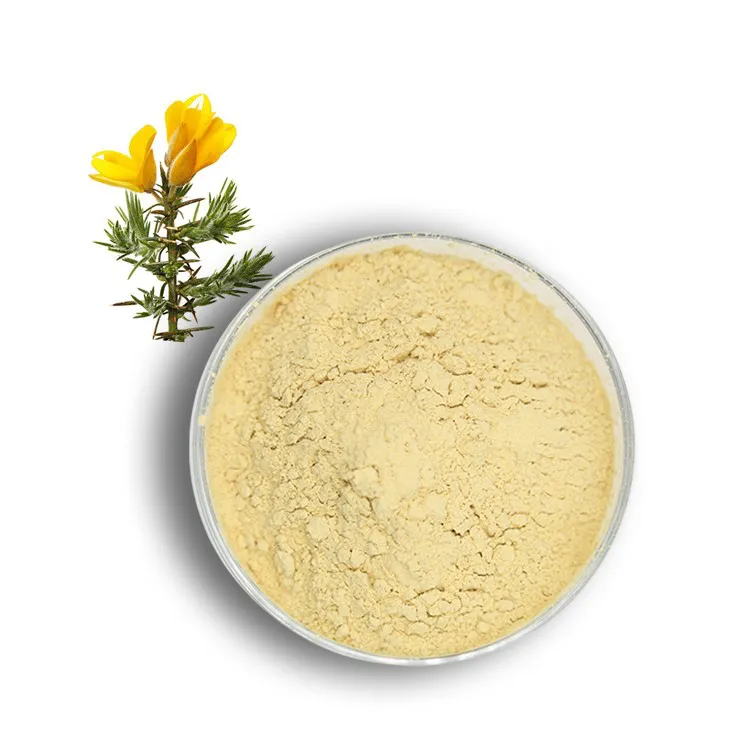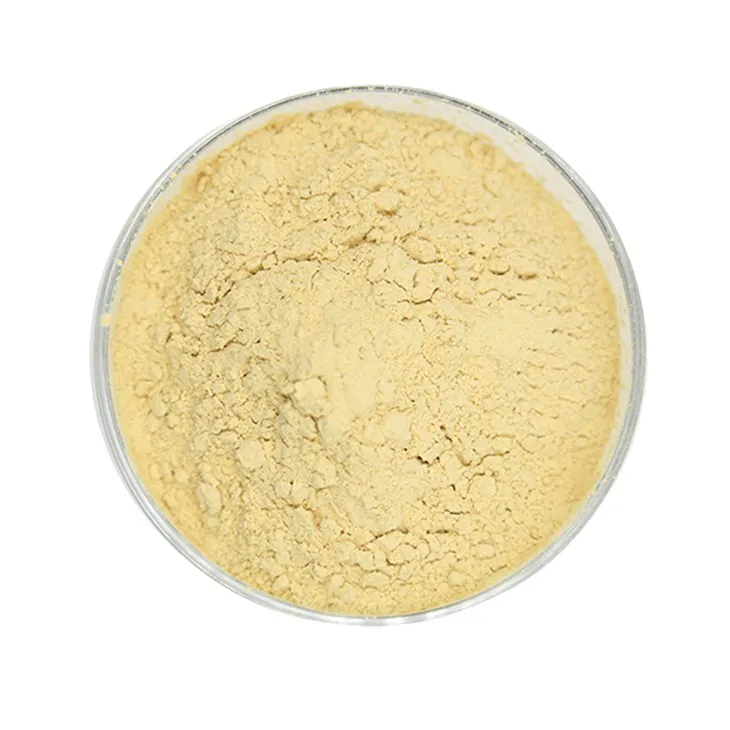- 0086-571-85302990
- sales@greenskybio.com
Genistein: Nature's Best - Kept Secret.
2024-11-13

1. Introduction to Genistein
Genistein is a fascinating compound that has been gradually emerging from the shadows of nature's vast chemical repertoire. It is a natural isoflavone, which is a type of phytoestrogen. These phytoestrogens are plant - derived compounds that can mimic the action of estrogen in the human body to some extent. Genistein is found predominantly in plants, with soybeans being one of the richest sources. It also exists in other legumes and some types of vegetables. This compound has caught the attention of the scientific community due to its wide - ranging potential health benefits.

2. Chemical Structure and Properties
The chemical structure of genistein is what gives it its unique properties. It has a molecular formula of C₁₅H₁₀O₅. Genistein contains two phenolic rings and a chromene - type structure. This structure is important for its antioxidant activity. The phenolic hydroxyl groups in genistein can donate hydrogen atoms to free radicals, thereby neutralizing them. This antioxidant property is crucial for protecting the body's cells from oxidative damage, which is associated with various diseases such as cancer, heart disease, and neurodegenerative disorders.

3. Sources of Genistein in Nature
3.1 Soybeans
Soybeans are by far the most well - known source of genistein. Soy - based products such as tofu, soy milk, and tempeh are rich in this isoflavone. In fact, the genistein content in soybeans can vary depending on factors such as the variety of soybean, the growing conditions, and the processing methods. For example, fermented soy products may have different levels of genistein compared to non - fermented ones. Fermentation can sometimes increase the bioavailability of genistein, making it more easily absorbed by the body.
3.2 Other Legumes
While soybeans are the major source, other legumes also contain genistein. Lentils, chickpeas, and peas, for instance, have been found to have small amounts of this compound. However, the levels are generally much lower compared to soybeans. These legumes are still an important part of a healthy diet, not only for their potential genistein content but also for their other nutritional components such as fiber, protein, and vitamins.
3.3 Vegetables
Some vegetables also contribute to the overall genistein intake. For example, certain types of green vegetables like broccoli and kale have been shown to contain genistein. Although the amounts are relatively small, when consumed as part of a balanced diet, they can add to the cumulative effect of genistein in the body. The presence of genistein in these vegetables further emphasizes the importance of a diverse diet for obtaining a wide range of beneficial compounds.

4. Health - Enhancing Properties of Genistein
4.1 Antioxidant Defense
As mentioned earlier, genistein is a powerful antioxidant. Oxidative stress occurs when there is an imbalance between the production of free radicals and the body's ability to neutralize them. Free radicals are highly reactive molecules that can damage cells, proteins, and DNA. Genistein's antioxidant activity helps to counteract this oxidative stress. By donating hydrogen atoms to free radicals, it converts them into less reactive species, reducing the potential damage to the body's cells. This antioxidant effect is beneficial for overall health and may play a role in preventing chronic diseases such as cancer, cardiovascular diseases, and age - related macular degeneration.
4.2 Anti - Cancer Effects
Genistein has shown significant potential in the fight against cancer. It can interfere with cancer cell growth and proliferation in several ways. One mechanism is by inhibiting the activity of certain enzymes that are involved in cell growth and division. For example, it can target tyrosine kinases, which are important enzymes in cell signaling pathways. By inhibiting these kinases, genistein can disrupt the abnormal growth signals in cancer cells. Additionally, genistein has been shown to induce apoptosis, or programmed cell death, in cancer cells. This is a natural process by which the body eliminates damaged or abnormal cells. Genistein can also affect the angiogenesis process, which is the formation of new blood vessels that tumors need to grow and spread. By inhibiting angiogenesis, genistein can starve tumors of the nutrients and oxygen they require for growth.
4.3 Estrogen - like Activity
Genistein has estrogen - like activity, which can have important implications, especially for women. In the body, estrogen plays a crucial role in various physiological processes such as the menstrual cycle, bone health, and maintaining the health of the reproductive system. Genistein can bind to estrogen receptors, although its binding affinity is much lower than that of natural estrogen. This estrogen - like activity may contribute to hormonal balance in women. For example, during menopause, when estrogen levels decline, genistein may provide some of the beneficial effects of estrogen, such as reducing the risk of osteoporosis. However, it is important to note that the effects of genistein on estrogen - related processes are complex and may vary depending on factors such as the individual's hormonal status and the overall diet.

5. Genistein and Heart Health
Genistein may also have a positive impact on heart health. One of the ways it can do this is by improving lipid profiles. It has been shown to lower levels of LDL cholesterol (the "bad" cholesterol) and triglycerides in the blood. By reducing these lipid levels, genistein can help to decrease the risk of atherosclerosis, which is the build - up of plaque in the arteries. Additionally, genistein's antioxidant properties can protect the heart muscle from oxidative damage. Oxidative damage to the heart muscle can lead to heart failure and other cardiac problems. Genistein may also have anti - inflammatory effects in the cardiovascular system, which can further contribute to heart health. Inflammation in the blood vessels is a key factor in the development of cardiovascular diseases.
6. Genistein and Bone Health
Due to its estrogen - like activity, genistein has been studied for its potential role in bone health. Estrogen is important for maintaining bone density, and as women age and estrogen levels decline, the risk of osteoporosis increases. Genistein can bind to estrogen receptors in bone cells, which may stimulate bone formation and inhibit bone resorption. Bone resorption is the process by which old bone is broken down and removed. By reducing bone resorption and promoting bone formation, genistein may help to maintain bone density. Some studies have suggested that consuming genistein - rich foods or supplements may be beneficial for preventing bone loss, especially in post - menopausal women. However, more research is needed to fully understand the relationship between genistein and bone health.
7. Bioavailability and Absorption of Genistein
The bioavailability of genistein, or how much of it can be absorbed and utilized by the body, is an important factor to consider. Genistein is a large molecule, and its absorption can be affected by various factors. When consumed in food, it is often bound to other compounds such as sugars and proteins. In the digestive tract, these bonds need to be broken down for genistein to be released and absorbed. The gut microbiota also plays a role in the metabolism of genistein. Some bacteria in the gut can convert genistein into more bioavailable forms. Additionally, factors such as individual differences in gut function, the presence of other foods in the diet, and the form of genistein (e.g., whether it is from a natural food source or a supplement) can all influence its bioavailability. For example, some studies have shown that genistein from fermented soy products may be more bioavailable than that from non - fermented products.
8. Safety and Potential Side Effects of Genistein
Generally, genistein is considered safe when consumed in normal dietary amounts. However, like any compound, it may have potential side effects, especially when consumed in large amounts or in certain populations. Some concerns have been raised about its estrogen - like activity. In high doses, it may disrupt the normal hormonal balance in the body. For example, in men, there are concerns that excessive genistein intake could potentially affect testosterone levels or have other hormonal effects. Additionally, some studies have suggested that genistein may interact with certain medications, such as tamoxifen, which is used in the treatment of breast cancer. Therefore, it is important for individuals to consult with their healthcare providers before taking genistein supplements, especially if they have underlying health conditions or are taking medications.
9. Genistein in Dietary Supplements
Genistein is available in dietary supplement form. These supplements are often marketed for their potential health benefits, such as those related to menopause symptoms, bone health, and cancer prevention. However, the quality and purity of these supplements can vary widely. When considering taking a genistein supplement, it is important to choose a reputable brand. Look for products that have been tested for quality and safety. Also, it is important to follow the recommended dosage instructions. As mentioned earlier, excessive intake of genistein can have potential risks, so it is crucial to use supplements responsibly.
10. Conclusion
Genistein is truly a remarkable compound that nature has kept somewhat of a secret until recently. Its presence in plants, especially soybeans, provides an opportunity for individuals to obtain its potential health benefits through their diet. From its antioxidant properties to its potential anti - cancer, heart - healthy, and bone - health - promoting effects, genistein has a lot to offer. However, more research is still needed to fully understand its mechanisms of action, optimal dosages, and potential long - term effects. As with any dietary component or supplement, it is important to approach genistein with caution and to make informed decisions based on scientific evidence and individual health needs.
FAQ:
What is genistein?
Genistein is a natural isoflavone that is mainly found in plants such as soybeans.
What are the health - enhancing properties of genistein?
Genistein has many health - enhancing properties. It plays a role in antioxidant defense, fighting harmful free radicals in the body. It also has potential anti - cancer effects by interfering with cancer cell growth and proliferation. Additionally, it shows estrogen - like activity which may contribute to hormonal balance in women.
How does genistein combat free radicals?
Genistein has antioxidant properties. It can neutralize free radicals, which are unstable molecules that can cause damage to cells and tissues in the body. By doing so, it helps to protect the body from oxidative stress and related diseases.
What is the significance of genistein's estrogen - like activity?
Genistein's estrogen - like activity can be significant for women. It may help to maintain hormonal balance, which is important for various aspects of women's health such as menstrual regularity and bone health.
Where can we find genistein in nature?
Genistein is predominantly found in plants like soybeans. It can also be present in other leguminous plants.
Related literature
- Title: Genistein and its impact on human health"
- Title: "The role of genistein in antioxidant and anti - cancer mechanisms"
- Title: "Genistein: A natural compound for hormonal balance"
- ▶ Hesperidin
- ▶ citrus bioflavonoids
- ▶ plant extract
- ▶ lycopene
- ▶ Diosmin
- ▶ Grape seed extract
- ▶ Sea buckthorn Juice Powder
- ▶ Beetroot powder
- ▶ Hops Extract
- ▶ Artichoke Extract
- ▶ Reishi mushroom extract
- ▶ Astaxanthin
- ▶ Green Tea Extract
- ▶ Curcumin Extract
- ▶ Horse Chestnut Extract
- ▶ Other Problems
- ▶ Boswellia Serrata Extract
- ▶ Resveratrol Extract
- ▶ Marigold Extract
- ▶ Grape Leaf Extract
- ▶ blog3
-
High purity olive leaf extract
2024-11-13
-
Lavender oil extraction method
2024-11-13
-
100% organic virgin sea buckthorn fruit oil
2024-11-13
-
Lotus leaf extract powder factory in China
2024-11-13
-
China aged garlic extract supplier
2024-11-13
-
Deer antler extract powder manufacturer
2024-11-13
-
Saw palmetto extract vs whole herb
2024-11-13
-
Purple Sweet Potato Extract
2024-11-13
-
Phyllanthus Emblica Extract
2024-11-13
-
Aguaje Extract
2024-11-13
-
Chaste Berry Extract
2024-11-13
-
Eucommia Ulmoides Extract
2024-11-13
-
Polygonum Cuspidatum Extract
2024-11-13
-
Curcumin
2024-11-13
-
Red Wine Extract
2024-11-13
-
Jujube Extract
2024-11-13
-
Alisma Extract
2024-11-13





















